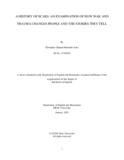A history of scars: An examination of how war and trauma changes people and the stories they tell
Abstract
This paper will attempt to analyse the effects of war, intergenerational trauma and
selective persecution on the human psyche, and how that is reflected in literature through the
theoretical frameworks of New Historicism and trauma studies. The aims of this paper is to
examine if only the persecuted or the defeated are affected by trauma, or if there are
opportunities for polyphonic discourse, with the perspectives from both sides being highlighted.
The first part of the paper will discuss the American Civil War and its aftermath, particularly the
reflection of self-loathing portrayed in William Faulkner’s Absalom, Absalom! and the crisis of
identity caused by trauma and its manifestation in Richard Wright’s Native Son. The second part
of the paper will delve into the history of the War of Liberation of Bangladesh, and discuss
literature’s role in validating and propagating dominant ideological structures through capillaries
of power. Furthermore, this section will also assess the importance of polyphonic narratives and
dialogic discourse for healthy identity formation, and discuss the potential of peripheral
narratives through an examination of Shahidul Zahir’s Mukher Dike Dekhi. Finally, this paper
will offer potential pathways to locate and render minority narratives, which can be beneficial to
interrogate the past and contextualise the present in order to better understand the interplay of
power. I hope this paper will help future researchers appreciate the gravity of history, and the
extent to which it is woven into our national and individual identities.
Description
This thesis is submitted in partial fulfillment of the requirements for the degree of Bachelor of Arts in English, 2021.Department
Department of English and Humanities, Brac UniversityType
ThesisCollections
- Thesis, B.A. (English) [647]

